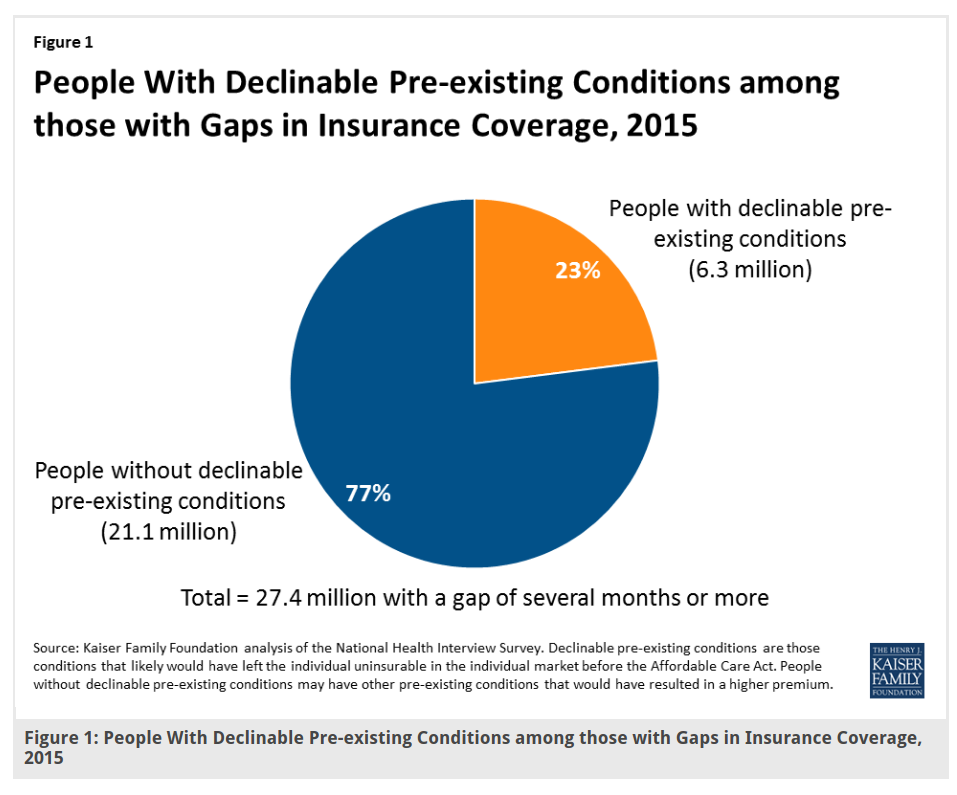In the absence of a Congressional Budget Office assessment of the final version of the American Health Care Act, which the House of Representatives passed on May 4, there is a large question mark hovering around the bill: What impact will it have on people with pre-existing conditions in states that seek and receive a waiver allowing them to change existing requirements on insurance providers.
Billed as a means of repealing and replacing the Affordable Care Act, the AHCA nevertheless faced a tough path in the House because of a disconnect between the hard-right Freedom Caucus, which wanted to strip away virtually all of the requirements that the ACA placed on insurers, and the more moderate Tuesday Group, which wasn’t prepared to go as far.
Related: How Trump Can Score a Big, Bipartisan Win on Health Care
A compromise struck at the last minute created the waiver system, which allows individual states the option of restructuring the health insurance market within their borders, providing they meet certain requirements. Among other things, the states would be allowed to change the rules meant to ensure that people with pre-existing conditions would be able to get insurance at affordable rates.

Under the ACA, insurers had to offer coverage to sick people at the same rate they offered to healthy people of the same age. Under certain circumstances, the AHCA would do away with that requirement, effectively pushing sick people into subsidized “high-risk pools” meant to isolate the most expensive patients and thereby reduce premiums for the healthy.
In order for a person to face higher rates based on their health, they would have to have allowed their health insurance coverage to lapse for a period of 63 days or more at some point in the previous year. At the time it was introduced, and after it passed, Republicans supporting the plan insisted that safeguards were in place to assure that few people would face serious consequences from the change.
But because the waiver provision was introduced at the last minute, its expected overall effect on the number of Americans with health insurance was never measured by the CBO. (An analysis from the congressional budget watchdog is expected next week.)
Related: GOP Struggles to Explain AHCA’s $880 Billion Medicaid Cuts
On Wednesday, the Kaiser Family Foundation, a think tank specializing in healthcare issues, took a crack at an estimate.
Using data from 2015, researchers determined that in that year, some 27.4 million Americans who were below the Medicare-eligibility age of 65, endured a break in their health coverage of at least several months. Of that 27 million, 6.3 million had pre-existing conditions that, in the years before the ACA made it illegal, would have resulted in automatic denial if they had applied for health insurance.
However, the study notes, the impact would not be limited to people with only the most severe health problems.
“Among the 21.1 million people who experienced a gap in coverage and did not have a declinable pre-existing condition, some also had pre-existing conditions (such as asthma depression, or hypertension) that would not have resulted in an automatic denial by individual market health insurers pre-ACA but that nonetheless could also result in a premium surcharge.”
Related: Why the GOP Health Care Plan Could Still Go Down in Flames
The measurement of the bill’s impact is admittedly uncertain. While it is clear that the threat of higher premiums creates an incentive for people to maintain continuous coverage, the authors write, “The question is how many would be able to do so, given the fact that the premium tax credits provided for in the AHCA would be 36 percent lower on average for marketplace enrollees than under the ACA and would grow more slowly over time.”
In the end, the biggest wildcard is how many states would choose to accept the AHCA’s waivers, the study concludes. “What states decide to do may ultimately have the greatest effect on how many people with pre-existing conditions face potentially unaffordable insurance premiums.”





